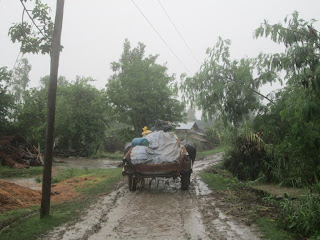§
AMRIT
BHANDARI
With the start of monsoon showers fears and worries of
the people residing by waterfront areas begin to increase. The incessant heavy rainfall
panics the residents in those areas especially when the downpour leads to
massive floods leaving the residents in a state of despair. The rainy season is
a curse to the panic-stricken denizens living in the bank of or nearby the
river. Every year the settlements nearby the rivers suffer from significant loss
of their property and physical displacement caused by the unprecedented level
of flood. Furthermore, the flood claims the lives of people, ravages their
farmland and other property leaving a number of people homeless.
Here I have a short article that explains how Early
Warning System established by Practical Action with financial support of ECHO's
disaster preparedness programme (DIPECHO) helped them to move from flood prone
settlement to a safe place this year. The story is based on field information.
The advent of early
monsoon this year has already portrayed its horrific pictures, a bad omen for
coming days during monsoon, causing severe consequences and leaving thousands
of people homeless in Darchula district. On the other part, an incessant rain
begun on 15 June this year in Bardiya district unexpectedly caused to raise water
level of Karniali River at Chisapani. While the Karnali relentlessly continued
to swell with the possibility to invade into a number of villages in Bardiya, an
electronic display board at District Police Office in Bardiya was updating
information on overflowing water level through the tele-matric system
established by Department of Hydrology and Meteorology (DHM). Parbati Gurung, a
staff of DHM located at Chisapani station was observing the gushing Karnali
River and updating information to District Police, Administration and Branch
office of Red-Cross intermittently in every 15 minutes.
 |
| People leaving for safe places with their belongings |
On
17 June, during afternoon, the river approximately crossed the danger line of
gauge reader at Chisapani. The Chief District Officer, Bardiya, Dr. Man Bahadur
BK was then informed henceforth he wasted no single second to call an emergency
meeting with Nepal Army, Armed Police Force, Red-Cross and other stakeholders
to keep them alert and prepare for the rescue and support.
Mahesh
Chandra Gautam, President of Nepal Red-Cross Society, Branch Office, Bardiya divulges
that District Administration, Police and Red-Cross staff were analysing the
information provided by the tele-metric system and Parbati Gurung. The digital
board placed by Practical Action was giving the information based on level of
water at Chisapani.
No
sooner the digital board showed that the water level at Chisapani was nearly
crossing the danger line, the community radio in Bardiya frequently started
airing information on possible danger in order to make communities alert residing
nearby the river. The Nepal Army, Armed Police Force and other stakeholders
hurriedly marched toward the flood prone settlements to help evacuate people to
the protected areas. An alerting siren started ringing in Rajapur, Bhimmapur,
Daulatpur, Patabhar, Manau, Khairichandapur, Gola and Pashupati Nagar of
Bardiya Districts. No sooner the flood invaded their settlement, people in the
areas begun to collect their important belongings, documents, foods, and
clothes and left home to the safe places. About 2620 people were lifted to the
safe vicinities.
A
local from Patabhar, Bardiya, Purna Ram Tharu reminisces, "We were
terribly frightened while we knew that the river is crossing danger line and entering
our settlement. But thank god, we could successfully leave our place before the
flood intrudes into our settlement. No human loss we had to bear this
time." Similarly Khusi Ram Tharu, President of Patabhar Disaster Risk
Management Committee shares his experiences, "No one is injured in such a
big flood, no considerable loss we faced. We had time to march on towards the
safe places with our belongings. We now realised that how Early Warning System
helps us in avoiding the precarious impact of flood."
 |
| People using tractor to carry their belongings to a safe place |
The
Early Warning System established by Practical Action with financial support of
the ECHO's disaster preparedness programme (DIPECHO) has now proved one of the
important system to avoid the human and materials loss due to flood. The
project has also provided equipment and accessories such as sirens, mikes,
jackets, boats and strings for handling emergency in case of flood.
Birkha Bahadur Sodari, Patabhar says, "We heard the loud
sirens in our village then we became alert and started packing important
documents, property and food and prepared to leave for a safe location. Again for
the second time we heard the sound of the siren then immediately moved to a
safe place.” The disaster management committee also worked perfectly in that critical
situation. Thanks to Practical Action, ECHO and the project, mitigation
infrastructure such as culverts and roads were in place to allow people to move
quickly during floods.
It is now well-known and proved that The Early Warning System installed in the Bardiya is highly effective guards against floods and flood-led natural disasters. If the system is promoted by the state in flood prone areas across the country, settlements close to riverfront areas will not face untimely deaths and loss of property.

No comments:
Post a Comment